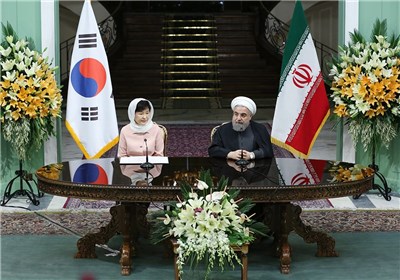
“Iran favors peace and stability in the Korean Peninsula, and we are basically opposed to production of any weapons of mass destruction,” the Iranian president said at a high-profile ceremony in Tehran on Monday, attended by his South Korean counterpart.
“It is our demand that the world be free from weapons of mass destruction and nukes, particularly in the Korean Peninsula and the Middle East region,” he said, adding that security in both regions is necessary for the expansion of bilateral relations.
Elsewhere in his comments, President Rouhani pointed to the 19 memorandums of understanding (MoUs) that the two countries signed at the ceremony, noting that one of the major agreements would turn the trade relations between Tehran and Seoul to “strategic, deep-rooted” ties.
Iran’s chief executive said it will come through South Korean companies’ investment in Iran as well as joint economic activities.
He also said that advanced technologies will be transferred to Iran from South Korea to that end.
Iran and South Korea have decided to triple the value of their trade, increasing the annual amount to $ 18 billion, he added.
For her part, South Korean President Park Geun-hye said her “significant, historic visit” to Iran comes against the backdrop of a new chapter in Iran’s ties with the international community.
She said the two countries are going to issue their first joint statement, which could become a good road map for the enhancement of Tehran-Seoul ties.
Heading a delegation of more than 250 Korean ministers, top officials and business people, Park arrived in Tehran on Sunday for a three-day official visit, marking the first summit between the two countries since they established diplomatic ties in 1962.
The visit follows a new wave of interest in ties with Iran after Tehran and the Group 5+1 (Russia, China, the US, Britain, France and Germany) on July 14, 2015 reached a conclusion over the text of a comprehensive 159-page deal on Tehran’s nuclear program.
The lasting nuclear deal, known as the Joint Comprehensive Plan of Action (JCPOA), took effect in January, terminating the nuclear-related sanctions imposed on Iran.
South Korea remains one of the major crude importers from Iran. The East Asian nation’s oil imports from Iran sharply increased earlier this year immediately after the anti-Iran economic sanctions were lifted under the JCPOA.
South Korea is the world's fifth-largest oil importer while Iran has the fourth largest oil reserves. The trade between the two countries is estimated to have stood at $ 6.1 billion in 2015.
Tasnim News Agency - politics solhkhabar | Peace International News Agency Peace International News Agency , Peace News , International Agency News of Peace
solhkhabar | Peace International News Agency Peace International News Agency , Peace News , International Agency News of Peace